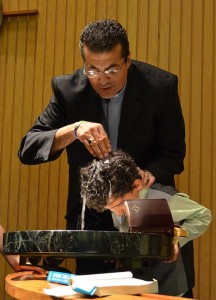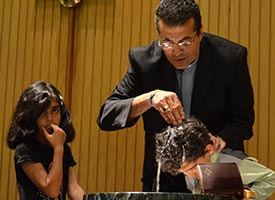By Jennifer Bagnall
Barron, Wis. — a farming community of 3,398 people — is home to the local high school’s Golden Bears football team, the Jennie-O Turkey Store and Salem Lutheran Church. It’s also home to the Al-Rahma Mosque.

To many, it might seem unlikely that Muslim populations would spring up in the small towns of America’s heartland, but it’s a scenario that’s becoming more and more common as immigrant populations find jobs and settle in communities like Barron.
Lutheran congregations are often unprepared. While wanting to reach out to their new neighbors with the Gospel of Jesus Christ, they may be unsure of how to overcome the cultural and language barriers.
Now the Lutheran Heritage Foundation, in partnership with Lutheran Hour Ministries, has published a powerful resource to help overcome those barriers: Luther’s Small Catechism in the Arabic language.
“Allah isn’t the only one who speaks Arabic,” said the Rev. Robert Rahn, founder of the Lutheran Heritage Foundation. “Through this Arabic Small Catechism, God our Father speaks to the Arabic people of the world, calling them to saving faith in Jesus Christ.”
Fastest-growing religion
According to the 2010 U.S. Religion Census, Islam experienced the greatest growth rate among the American mainline religious groups studied, with a 66.7 percent increase from 2000 to 2010. More than 2.5 million Muslims live in the United States today — up from 1 million in 2000.
“Over the past few years, I’ve noticed that calls requesting Christian materials in Arabic have become more frequent,” said Eric Gates, Lutheran Hour Ministries’ regional director for Africa and the Middle East. “The calls have come from all over the United States and Canada, from Toronto to Los Angeles, Texas to Chicago. We need to stand ready to share God’s Word and [the] promise of salvation to these people, in their heart language of Arabic.”
“There’s a lot of work to be done. It just amazes me,” agreed the Rev. Karim Baidaoui, missionary at-large to Muslim people in the LCMS Texas District. “We are barely scratching the surface when it comes to reaching out to the Muslim people who are here in our neighborhoods.”
Baidaoui’s neighborhood is in Dallas, where he heads a Muslim outreach ministry called Disciples of the Way. “Over 25,000 Arabic-speaking refugees live a mile and a half away from our church,” he said. “It’s like a Mecca!”
One of the biggest challenges in sharing the Good News with Arabic-speaking people has been the lack of Lutheran materials in their language.
“Luther’s Small Catechism is the only Lutheran literature available in Arabic,” explained the Rev. Hicham Chehab, who has a Muslim-outreach ministry based out of Peace Lutheran Church in Lombard, Ill., just outside Chicago. “There is other literature that’s Christian, but strictly speaking, this is the only Lutheran document I have in Arabic that I can use for baptismal instruction. It’s the best tool to start with for evangelism or discipleship.”
Baidaoui agrees. “It’s my favorite book, next to the Bible,” he said. “It’s how I studied the Christian faith when I was a Muslim. I read the Bible, but there were things I didn’t understand. The catechism had all the verses I needed to understand with explanation, when I was by myself.”
Beginning conversations
Establishing contact with Muslims is far outside the experience of many Lutherans, but congregations and ministries throughout the LCMS are beginning to make inroads. Disciples of the Way in Dallas has had great success by offering sewing classes to immigrant women, as well as writing, vocabulary and computer classes. Other congregations and campus ministries offer English-as-a-second-language conversation classes.
For congregations just beginning a Lutheran outreach to Arabic-speaking people in their neighborhood, simply having materials in their own language is a positive first step.
When the Jennie-O Turkey Store desperately needed workers on the production line at their factory in Barron, they sponsored 300 Somali refugees who had previously settled in the Minneapolis-St. Paul area, 85 miles away. “That is how, all of a sudden, 10 percent of Barron’s population is Somali and how we now have a Muslim mosque two doors down from us,” said the Rev. Robert Mueller, pastor at Salem Lutheran Church.
Because the language barrier prevents meaningful conversations about religion, church members now keep a supply of Arabic Bibles and catechisms on hand for when their Somali co-workers express curiosity about the Christian faith. “It’s essential to keep Arabic materials here so that if someone is interested and wants to sit down and talk, we surely can find a way,” Mueller said.
A family in Christ
Finding ways to welcome Arab Americans into the Lutheran church family is vital, believes Baidaoui. For new immigrants striving to learn a new culture and language, turning away from the support of their Muslim community is especially difficult.
“The new Arab Christian wonders, ‘Where will I go? All the people I know, these are my friends and family,’ ” Baidaoui said. “Our Lutheran churches must ask ourselves, are we willing to take them in? Do we have programs where they can come and fill the place of family?”
Congregations need to have patience, Chehab cautions, because it often takes a great deal of time for Muslims to openly embrace the Christian faith.
“Islam is a shame culture, and it is considered treason to convert or look into another religion,” Chehab said. “[In other countries], converts are ostracized, persecuted, or maybe killed. In America, they are ostracized; they lose their support system, and the American church does not give them enough support. But in spite of all odds against them, the Holy Spirit calls them to faith.”
The Holy Spirit is indeed calling Arabic-speaking people to faith in Jesus Christ: Chehab has baptized 23 people since beginning his ministry five years ago.
“We don’t baptize any Arab before going through the Arabic Small Catechism,” said Chehab. “Some read the Bible but don’t know what it means. Through our Lutheran Confessions and the catechism, we know exactly what the Bible means!”
“The LCMS is being awakened to a lot of things the Holy Spirit is doing among the Arab people,” agreed Baidaoui. “We Lutherans have such a beautiful doctrine; we are so confident about our faith. We have good books, good ways of teaching the faith and helping our children. We have a great heritage!”
The Lutheran Heritage Foundation (LHF), a recognized service organization of the LCMS, has translated and published books of the Lutheran faith into more than 85 languages.
To request an Arabic Small Catechism, or to see what other books LHF has printed in the languages of the world, go to LHFmissions.org or call 800-554-0723. A gift of $5 helps cover the costs of printing and shipping an Arabic catechism and enables LHF to continue in its mission.
Jennifer Bagnall is public relations coordinator for the Lutheran Heritage Foundation.
